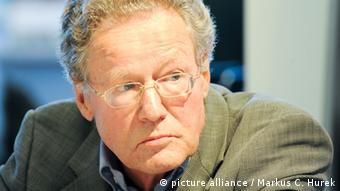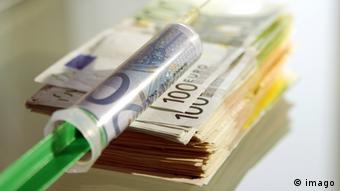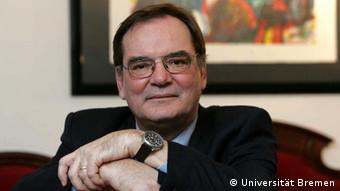Opponents of the euro in Germany have founded a new party in favor of
abolishing Europe's common currency. But critics question whether the
rather academic group can pack the populist punch it needs to enter
parliament.
"The Alternative for Germany" - Germany's new party opposing the
eurozone - is unlikely to impress Angela Merkel. The German chancellor
takes pride in her policy aimed at saving Europe's monetary union. "The
end of the euro would also be the end of the European Union," she has
said - justification in her view for why the monetary union must be
sustained.
But there is a substantial group within Germany that disagrees. In a survey conducted by the Germany weekly news magazine "Der Spiegel" in July 2012, 54 percent of interviewees said they don't believe investing vast sums of money to keep the common European currency is really worth it.
Opposition to the common currency in not reflected in the German parliament at all, says Konrad Adam. For years, he was a journalist at the center-right German daily "Frankfurter Allgemeine Zeitung," and has decided to start the new political party together with a handful of business experts who have worked in media and research.
The group, which calls itself Alternative for Germany, demands the dissolution of the eurozone and an open discussion of bailout strategies.
The euro is ‘destroying Europe'
Adam is frustrated about the lack of representation for euro opponents in parliament.
“All of the parties in the Bundestag have effectively the same opinion when it comes to rescuing the euro,” he told DW. “The only distinction between them is how much money should be invested and when. The euro is seen as holy, and anyone with a differing opinion is either dismissed as a populist or is shamed. That is not right.”
That's what led Adam to band together with like-minded journalists and scholars, such as Bernd Lucke, who teaches economics at the University of Hamburg, to start their own party.
“When I go to vote, I want a choice, which is why we wanted to create an alternative,” Adam said.
The issue isn't exactly minor in the German political arena. Germany must contribute 21.7 billion euros ($28.2 billion) to the euro rescue fund, which is meant to prevent EU countries with financial problems from slipping into bankruptcy by providing such countries with favorable lending conditions. So far, Greece, Ireland, Portugal, Spain and Cyprus have tapped into the fund.
According to the founders of Alternative for Germany, the possibility of getting rid of the euro and stopping the payments is being ignored by German politicians. They believe the end to the common currency to be the best thing that could happen to Europe.
“We are afraid that Europe isn't benefitting from the euro, but is actually being subtly destroyed by it,” Lucke told DW.
Dissolving the eurozone, not the EU
Lucke clarifies however that while the party is against the euro, it is not against European unity. The party focuses on getting rid of the eurozone. They call for the countries to either choose between national currencies, such as the deutschmark, the franc, or the drachma, or to create smaller currency unions. Adam could envision a northern euro and a southern euro, for example
The founders of Alternative for Germany don't want to get too specific with such proposals at the moment. While they support the principle of adherence to EU treaties, the group's members also hope to see changes to EU treaties that would allow Germany and other countries legal means of exiting the eurozone. Further, the new party is calling for binding referendums that would give EU citizens more power to make decisions.
A decision on whether the party fulfils the criteria to take part in Germany's federal elections this September is expected in April. At the very latest, the party's leaders hope to take part in the European elections in 2014.
A 'dangerous' position?
Rudolf Hickel, an economist and former head of the Institute of Labor and Economics (IAW) at the University of Bremen, considers Alternative for Germany's chances for success in September's elections to be slim.
“Normally, I'd certainly give a party like this a chance to reach five percent,” Hickel told DW, referring to the law in Germany that a political party must win at least five percent of the vote to gain parliamentary representation. “But the people behind Alternative for Germany are the best guarantee that the party won't make it into the Bundestag. They are professors and frustrated economists. If the party were headed by a populist, I'd consider them dangerous.”
Hickel does welcome an open debate about the euro rescue mechanisms, but he considers abandoning the currency bloc to be very dangerous.
“If Greece, for example, was out of the euro, it would be a permanently poor country, but would remain in the European Union,” Hickel explains. “And I can say now that, in that case, the EU would have to help with payments, or pressure would mount on Greece until it left the European Union. Then other EU countries would have to pay more. That would be an extreme burden on the European project."
That's where the founders of Alternative for Germany disagree. The party believes Germany's political elite must stop clinging to the joint currency without paying more attention to the sacrifices being made to keep the currency bloc afloat along the way.
But there is a substantial group within Germany that disagrees. In a survey conducted by the Germany weekly news magazine "Der Spiegel" in July 2012, 54 percent of interviewees said they don't believe investing vast sums of money to keep the common European currency is really worth it.
Opposition to the common currency in not reflected in the German parliament at all, says Konrad Adam. For years, he was a journalist at the center-right German daily "Frankfurter Allgemeine Zeitung," and has decided to start the new political party together with a handful of business experts who have worked in media and research.
The group, which calls itself Alternative for Germany, demands the dissolution of the eurozone and an open discussion of bailout strategies.
The euro is ‘destroying Europe'
Adam is frustrated about the lack of representation for euro opponents in parliament.
“All of the parties in the Bundestag have effectively the same opinion when it comes to rescuing the euro,” he told DW. “The only distinction between them is how much money should be invested and when. The euro is seen as holy, and anyone with a differing opinion is either dismissed as a populist or is shamed. That is not right.”
That's what led Adam to band together with like-minded journalists and scholars, such as Bernd Lucke, who teaches economics at the University of Hamburg, to start their own party.
“When I go to vote, I want a choice, which is why we wanted to create an alternative,” Adam said.
The issue isn't exactly minor in the German political arena. Germany must contribute 21.7 billion euros ($28.2 billion) to the euro rescue fund, which is meant to prevent EU countries with financial problems from slipping into bankruptcy by providing such countries with favorable lending conditions. So far, Greece, Ireland, Portugal, Spain and Cyprus have tapped into the fund.
According to the founders of Alternative for Germany, the possibility of getting rid of the euro and stopping the payments is being ignored by German politicians. They believe the end to the common currency to be the best thing that could happen to Europe.
“We are afraid that Europe isn't benefitting from the euro, but is actually being subtly destroyed by it,” Lucke told DW.
Dissolving the eurozone, not the EU
Lucke clarifies however that while the party is against the euro, it is not against European unity. The party focuses on getting rid of the eurozone. They call for the countries to either choose between national currencies, such as the deutschmark, the franc, or the drachma, or to create smaller currency unions. Adam could envision a northern euro and a southern euro, for example
The founders of Alternative for Germany don't want to get too specific with such proposals at the moment. While they support the principle of adherence to EU treaties, the group's members also hope to see changes to EU treaties that would allow Germany and other countries legal means of exiting the eurozone. Further, the new party is calling for binding referendums that would give EU citizens more power to make decisions.
A decision on whether the party fulfils the criteria to take part in Germany's federal elections this September is expected in April. At the very latest, the party's leaders hope to take part in the European elections in 2014.
A 'dangerous' position?
Rudolf Hickel, an economist and former head of the Institute of Labor and Economics (IAW) at the University of Bremen, considers Alternative for Germany's chances for success in September's elections to be slim.
“Normally, I'd certainly give a party like this a chance to reach five percent,” Hickel told DW, referring to the law in Germany that a political party must win at least five percent of the vote to gain parliamentary representation. “But the people behind Alternative for Germany are the best guarantee that the party won't make it into the Bundestag. They are professors and frustrated economists. If the party were headed by a populist, I'd consider them dangerous.”
Hickel does welcome an open debate about the euro rescue mechanisms, but he considers abandoning the currency bloc to be very dangerous.
“If Greece, for example, was out of the euro, it would be a permanently poor country, but would remain in the European Union,” Hickel explains. “And I can say now that, in that case, the EU would have to help with payments, or pressure would mount on Greece until it left the European Union. Then other EU countries would have to pay more. That would be an extreme burden on the European project."
That's where the founders of Alternative for Germany disagree. The party believes Germany's political elite must stop clinging to the joint currency without paying more attention to the sacrifices being made to keep the currency bloc afloat along the way.









